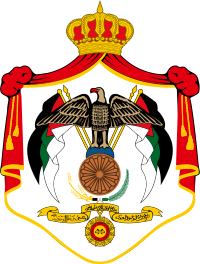
Fatah, formally the Palestinian National Liberation Movement, is a Palestinian nationalist and social democratic political party. It is the largest faction of the confederated multi-party Palestine Liberation Organization (PLO) and the second-largest party in the Palestinian Legislative Council (PLC). Mahmoud Abbas, the President of the Palestinian Authority, is the chairman of Fatah.
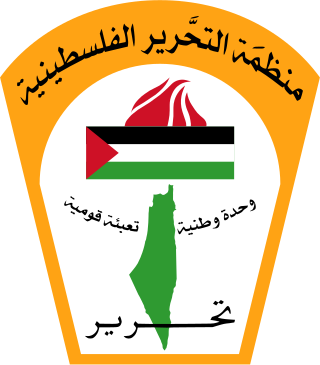
The Palestine Liberation Organization is a Palestinian nationalist coalition that is internationally recognized as the official representative of the Palestinian people in both the Palestinian territories and the diaspora. It is currently represented by the Palestinian Authority based in the West Bank city of Al-Bireh.

The West Bank, so called due to its location relative to the Jordan River, is the larger of the two Palestinian territories claimed by the State of Palestine. A landlocked territory near the coast of the Mediterranean Sea in the Levant region of West Asia, it is bordered by Jordan and the Dead Sea to the east and by Israel to the south, west, and north. Since 1967, the territory has been occupied by Israel and in 2024 an advisory opinion of the International Court of Justice determined that the occupation is illegal under international law.

The history of Jordan refers to the history of the Hashemite Kingdom of Jordan and the background period of the Emirate of Transjordan under British protectorate as well as the general history of the region of Transjordan.
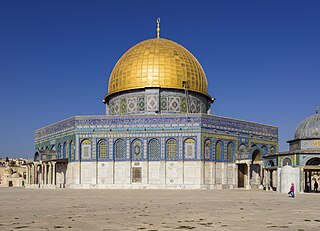
The history of the State of Palestine describes the creation and evolution of the State of Palestine in the West Bank and Gaza Strip. During the British mandate period, numerous plans of partition of Palestine were proposed but without the agreement of all parties. In 1947, the United Nations Partition Plan for Palestine was voted for. The leaders of the Jewish Agency for Palestine accepted parts of the plan, while Arab leaders refused it. This triggered the 1947–1949 Palestine war and led, in 1948, to the establishment of the state of Israel on a part of Mandate Palestine as the Mandate came to an end.
Palestinian refugees are citizens of Mandatory Palestine, and their descendants, who fled or were expelled from their country, village or house over the course of the 1948 Palestine war and during the 1967 Six-Day War. Most Palestinian refugees live in or near 68 Palestinian refugee camps across Jordan, Lebanon, Syria, the West Bank and the Gaza Strip. In 2019 more than 5.6 million Palestinian refugees were registered with the United Nations.
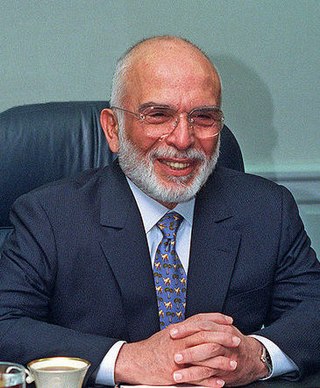
Hussein bin Talal was King of Jordan from 11 August 1952 until his death in 1999. As a member of the Hashemite dynasty, the royal family of Jordan since 1921, Hussein was a 40th-generation direct descendant of the Islamic prophet Muhammad.

The occupied Palestinian territories, also referred to as the Occupied Palestinian Territory and the Palestinian territories, consist of the West Bank and the Gaza Strip—two regions of the former British Mandate for Palestine that have been occupied by Israel since the Six-Day War of 1967. These territories make up the State of Palestine, which was self-declared by the Palestine Liberation Organization in 1988 and is recognized by 146 out of 193 UN member states.

East Jerusalem is the portion of Jerusalem that was held by Jordan after the 1948 Arab–Israeli War, as opposed to West Jerusalem, which was held by Israel. Under international law, East Jerusalem is considered part of the West Bank, and Palestinian territories, and under illegal occupation by Israel. Many states recognize East Jerusalem as the capital of the State of Palestine, whereas other states assert that East Jerusalem "will be the capital of Palestine", while referring to it as "an occupied territory". In 2020, East Jerusalem had a population of 595,000 inhabitants, of which 361,700 (61%) were Palestinian Arabs and 234,000 (39%) Jewish settlers. Israeli settlements in East Jerusalem are illegal under international law and in the eyes of the international community.
The so-called Elon Peace Plan is a plan to resolve the Israeli–Palestinian conflict through the principles of rehabilitation of Palestinian refugees, Israeli sovereignty over the occupied Palestinian territories, and strategic cooperation with Jordan, based on Jordan becoming a Palestinian state.
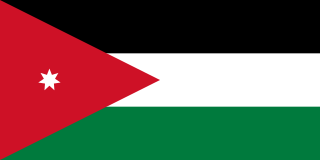
The Jordanian administration of the West Bank officially began on April 24, 1950, and ended with the decision to sever ties on July 31, 1988. The period started during the 1948 Arab-Israeli War, when Jordan occupied and subsequently annexed the portion of Mandatory Palestine that became known as the West Bank, including East Jerusalem. The territory remained under Jordanian control until it was occupied by Israel during the 1967 Six Day War and eventually Jordan renounced its claim to the territory in 1988.

The Parliament of Jordan is the bicameral Jordanian national assembly. Established by the 1952 Constitution, the legislature consists of two houses: the Senate and the House of Representatives.

Abdullah Rimawi was the head of the Ba'ath Party in Jordan in the 1950s. He served as Foreign Affairs Minister in Suleiman Nabulsi's government in 1957. A staunch pan-Arabist, Rimawi became one of the most vocal opponents of the Hashemite ruling family in Jordan and favored union with Syria. He fled Jordan in 1957 as the result of a crisis between the leftist government he was a part of and the royal family. He based himself in the United Arab Republic, where he drew closer to UAR President Gamal Abdel Nasser provoking his expulsion from the Ba'ath Party—which was at odds with Nasser—in 1959. Soon after he founded a splinter party called the Arab Socialist Revolutionary Ba'ath Party. During his exile, he allegedly made a number of attempts to attack or undermine the Jordanian monarchy.
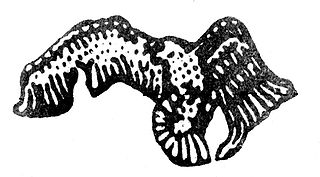
The Arab Socialist Ba'ath Party, also referred to as the pro-Iraqi Ba'ath movement, is a Ba'athist political party which was headquartered in Baghdad, Iraq, until 2003. It is one of two parties which emerged from the 1966 split of the original Ba'ath Party.

The Jordanian Arab Socialist Ba'ath Party (JASBP), previously known as the Arab Socialist Ba'ath Party – Jordan Region is a political party in Jordan. It is the Jordanian regional branch of the Iraqi-led Ba'ath Party.

The two-state solution is a proposed approach to resolving the Israeli–Palestinian conflict, by creating two states on the territory of the former Mandatory Palestine. It is often contrasted with the one-state solution, which is the establishment a single state in former Mandatory Palestine with equal rights for all its inhabitants. The two-state solution is supported by many countries, and the Palestinian Authority. Israel currently does not support the idea, though it has in the past.
The Palestinian National Council is the legislative body - in Arabic, the Majlis - of the Palestine Liberation Organization (PLO). The PNC is intended to serve as the parliament that represents all Palestinians inside and outside the Palestinian territories, and all sectors of the worldwide Palestinian community, including political parties, popular organizations, resistance movements, and independent figures from all sectors of life.

Khaled Mashal is a Palestinian politician who served as chairman of the Hamas Political Bureau from 1996 until May 2017, where he was succeeded by Ismail Haniyeh. He was regarded as one of the most prominent leaders of Hamas since the death of Ahmed Yassin, alongside Ismail Haniyeh.

Palestinian nationalism is the national movement of the Palestinian people that espouses self-determination and sovereignty over the region of Palestine. Originally formed in the early 20th century in opposition to Zionism, Palestinian nationalism later internationalized and attached itself to other ideologies; it has thus rejected the occupation of the Palestinian territories by the government of Israel since the 1967 Six-Day War. Palestinian nationalists often draw upon broader political traditions in their ideology, such as Arab socialism and ethnic nationalism in the context of Muslim religious nationalism. Related beliefs have shaped the government of Palestine and continue to do so.

The National Socialist Party was a left-wing socialist political party established in Jordan in 1954.
